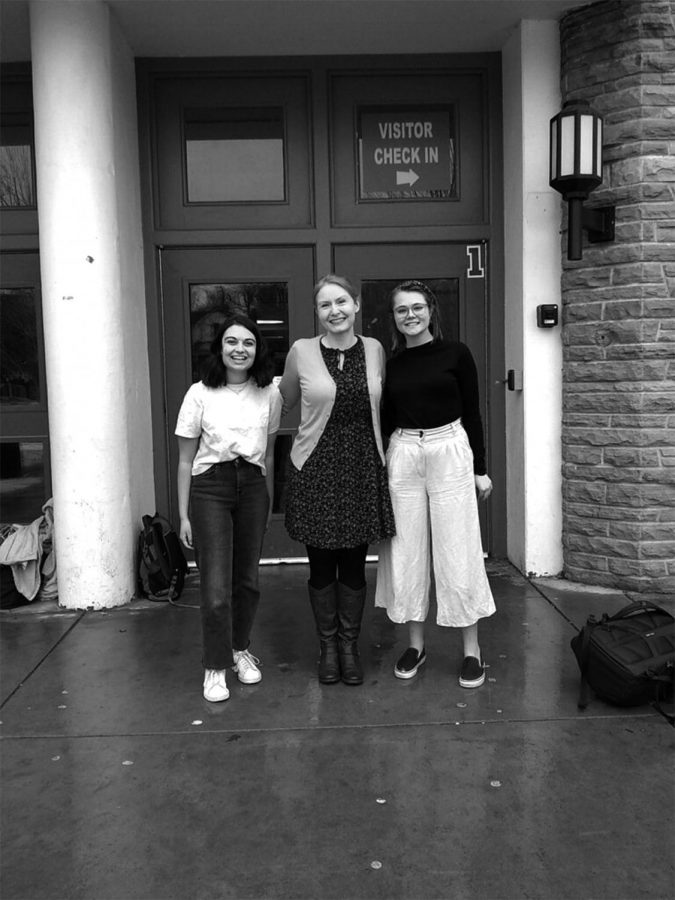Feminist Talk: A Chat with Women’s Empowerment Club’s Latest Guest Speaker
Akasha Brahmbhatt, Olivia Meikle, and Holly Sharfoth in front of Boulder High School. Photo by Natalie Mayurama.
Women’s Empowerment Club, more commonly referred to as WEC, meets on Thursdays during common lunch. WEC’s purpose is to bring together students at Boulder High School to talk about issues faced by women (and human beings) world wide. WEC usually has snacks and occasionally brings in guest speakers. Olivia Meikle, co-anchor of the delightfully witty and feminist What’s Her Name Podcast along with her sister, came into WEC on Dec. 5, 2019. What’s Her Name is a podcast about historical women who have been forgotten or misrepresented in today’s society. On Nov. 22, I interviewed Meikle along with the co-presidents of Women’s Empowerment Club, Holly Shafroth, junior, and Gwen Egan, senior.
Meikle is a professor of Women’s Studies at Naropa University. We asked her why she started taking Women’s Studies. Meikle said she took her first women’s studies class in college, specifically her sophomore year of college in Utah. She “fell in love with it” for the critical thinking skills it provides its students. Meikle loves Women’s Studies for its “interdisciplinary study” and how it teaches you to analyze “the world through the lens of women.” She thinks “everyone should take gender studies” because it forces you to look at the world differently. Meikle teaches Intro to Women’s and Gender studies, which she loves because she gets to watch “people learn and get their mind blown.” She refers to this course as “The teaser trailer” to Women’s Studies. She also teaches ECOFeminism, which is interesting because people have a good handle on the environment, but then they begin to look at the environment through a feminist lens. Still, they now think about how does environmental awareness links to feminism. She also teaches courses on Religion and Feminism.
We asked what inspired Meikle to start the podcast. “We wanted to do something, and we felt a push to do something.” They started their podcast before podcasting became popular. Her theory is, “you don’t have to be good at something if you’re first.” In 2017, when podcasting was an up and coming medium, Meikle realized, “we want to be first, there’s a market for it, so alright, let’s grab it now! Within three months – there were eight or nine other women’s podcasts.”
Part of her push for starting this podcast was when she was walking through a graveyard and saw a grave that just said “mother” and then dates, nothing else. She said, “it gutted” her.
Meikle was struck by the thought that “she’s been erased,” and this was the most significant push for her, to bring justice to these amazing women who have been erased.
Some struggles they faced were “we had to learn how to audio edit,” and her family members are “all scattered around.”
Meikle believes that Boulder High student’s “generation isn’t going to put up with” anything that has happened in the past, such as how married women couldn’t get a credit card without permission before 1978! “I credit the parenting – I think there was just a tipping point,” Meikle said.
Meikle believes that “If you’re not upset” about current-day issues, “you’re not paying attention. It’s no longer acceptable for it not to get better. You’re allowed to have an opinion and a place to put it. People can express themselves now; it gives you the idea that you deserve a platform and you have something to say. If you think you have something to say, you should say it. We raised a lot of Hermiones and Katnisses to change the world.”
The last question we asked was on her methodology for researching her podcasts. What’s Her Name focuses on women who have been forgotten about for many years, and it might be challenging to feel as though they serve them justice. She replied, “that is why we do interviews with experts of the specific women – I’m not doing the research! You want to interview people, so you don’t have to know anything, you have to know enough to ask semi-decent questions. It’s terrifying to ask, but the worst thing that can happen is they say no, or ignore you.” One of the hardest parts of podcasts is cutting out large chunks of the interview. “Cutting is sucky.”
Meikle came into Women’s Empowerment Club to talk more about her experience in media and how she got into podcasting in the first place. Students, WEC members and visitors alike had the opportunity to ask her questions, learning more about one of the amazing women challenging traditional media and reporting on the unsung heroines of our history!


